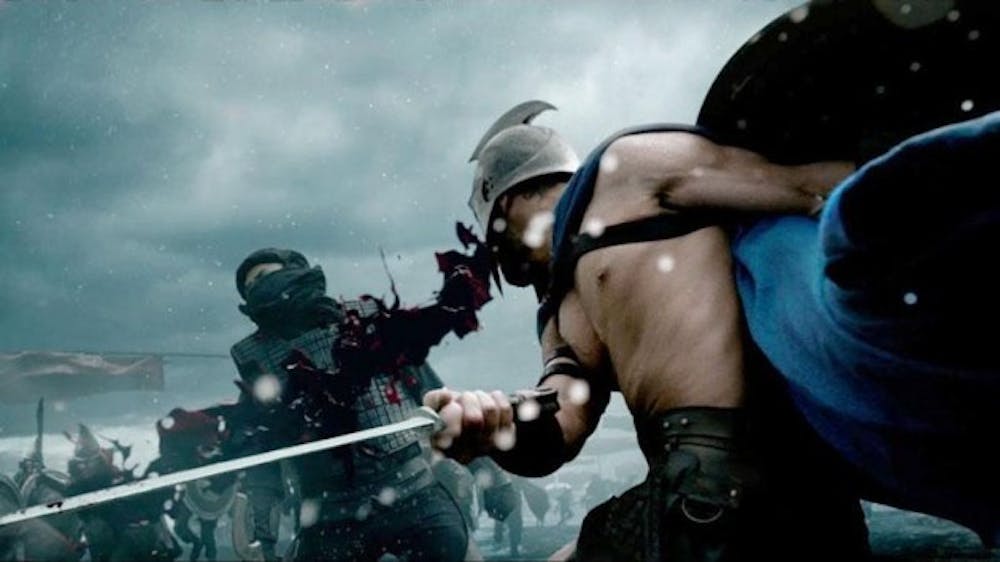Film: 300: Rise of an Empire
Release Date: March 7
Studio: Warner Bros. and Legendary Pictures
Grade: C+
At the onset of 300: Rise of an Empire, Queen Gorgo proclaims that "War is coming to Greece, and only a tidal wave of heroes' blood can save them."
The opening scene coats the screen in blood, guts and gore as scantily clad and muscle-laden Athenian soldiers led by General Themistokles slaughter invading forces en-masse, as Gorgo (Lena Headey, Game of Thrones) retells the Battle of Marathon.
Themistokles' (Sullivan Stapleton, Strike Back) heroic actions during the battle prevented King Darius' - 'the God-King' Xerxes' father - invasion of Greece 10 years before the events of 300 and set the stage for Xerxes' invasion a decade later.
The scene, like much of the film, is as stylized, action-packed and violent as 300 (2006) - if not even more so. The camera follows Themistokles through the unfolding carnage in a similar fashion to the cinematic treatment of King Leonidas, the protagonist of 300, during some of 300's key action sequences.
The shot, which slides in and out of slow motion as the hero cleaves brawn from bone, cutting down dozens of enemies and sending limbs and globs of blood flying through the air, will immediately remind some audience members of their experience viewing 300 eight years prior.
Despite the fact that Rise of an Empire shifts the focus from the Battle of Thermopylae - the central conflict of 300 - to the Battle of Salamis and changes directorial hands from Zack Snyder to the lesser-known Noam Murro (Smart People), it manages to remain visually cohesive with 300 to an awe-inspiring degree.
The film focuses on the conflict between the Themistokles-led Grecian navy and the far more massive Persian navy led by the vengeful Artemisia (Eva Green, White Bird in a Blizzard) during the Battle of Salamis, which took place during the same three days as the Battle of Thermopylae.
The film acts as a companion to the original; adding historical context to 300's events and motivations to characters like Xerxes (Rodrigo Santoro,The Last Stand) who previously had very little - if any - while establishing what drives new characters like Artemisia.
It also features a few scenes that directly tie Rise of an Empire's narrative into that of the original 300 - even exposing the varying political views of the Grecian city states within the series' historically influenced universe.
Whereas 300 began with a divided Greece and ended a year after the Battle of Thermopylae with the united Grecian army about to slaughter the disheveled remainder of Xerxes' forces at the beginning of the Battle of Plataea, Rise of an Empire shows how that union occurred and the true importance of King Leonidas and the brave 300's sacrificial actions.
With the broader context that Rise of an Empire provides, seeing Greece's transformation becomes more compelling, especially by the picture's conclusion that completes the story of 300 as a whole.
But what the film effectively exudes in context, visual cohesion and a broader narrative, it lacks in character and substance, ultimately leaving Rise of an Empire feeling flat in comparison to its predecessor.
Although the film initially finds success in depicting the inner workings of various characters like Xerxes and Artemisia, the motivations of the main characters, including Themistokles, are never acknowledged, revisited or reinforced by the characters themselves - undermining any semblance of character development that the film attempts to achieve.
Though Sullivan's Themistokles is a decent leading man, he's no charismatically empowered King Leonidas - played by Gerard Butler - in whom the audience could become invested. Nor is he Green, who delivers the best performance as the delightfully cold and malicious Artemisia.
Lines like "You fight much harder than you f***," as Artemisia says to Themistokles during the climactic fight screen, are part of a script that, just like the characters, leaves a lot to be desired.
The mantra "Seize your glory," attempts to become the new "This is Sparta," as the film as a whole begins to feel like it is trying to replicate 300 rather than tell its own tale. It feels too safe, too familiar.
With visuals and violence on par with its predecessor, Rise of an Empire attempts to rise above the original story by providing a larger context to the 300's very focused portrayal of events.
But somewhere between the expos?(c) and bloodshed, it forgot to give the audience anything worth caring about, leaving the film feeling too much about the tidal wave of blood and not enough about the heroes in it.
email: arts@ubspectrum.com





